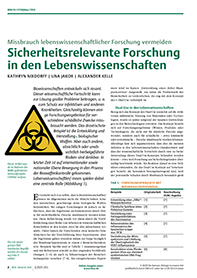Security-relevant research in the life sciences
DOI:
https://doi.org/10.11576/biuz-7910Keywords:
Biowaffen-Übereinkommen (BWÜ), Biosicherheit, biologische Waffen, Dual-Use, Dual-Use Research of Concern (DURC)Abstract
Biological weapons are categorically prohibited by the Biological and Toxin Weapons Convention (BTWC, BWC). While the peaceful use of the life sciences including scientific progress is allowed, the BTWC offers no guidance as to how the misuse potential of research results inherent in some life sciences work (the Dual Use problem) can be contained. Responsible handling of research results is thus highly relevant for life scientists. Guidelines dealing with so-called Dual-Use Research of Concern (DURC) were formulated in 2004 by the USA and recently discussed at the international level within the BTWC. The recommendations of the German Research Foundation (DFG) and the National Academy of Sciences (Leopoldina) for handling security-relevant research are a good example for such guidelines at the national level. These recommendations, conceived by scientists and affecting work in the life sciences, also offer the chance for life scientists themselves to shape the context of their work.


